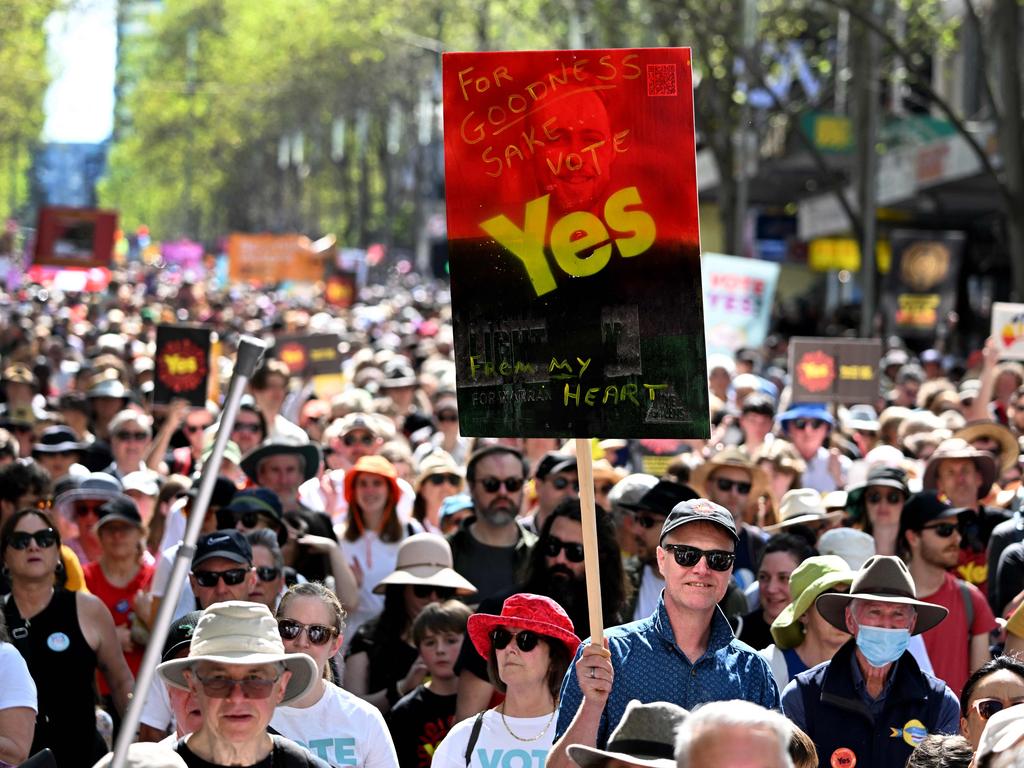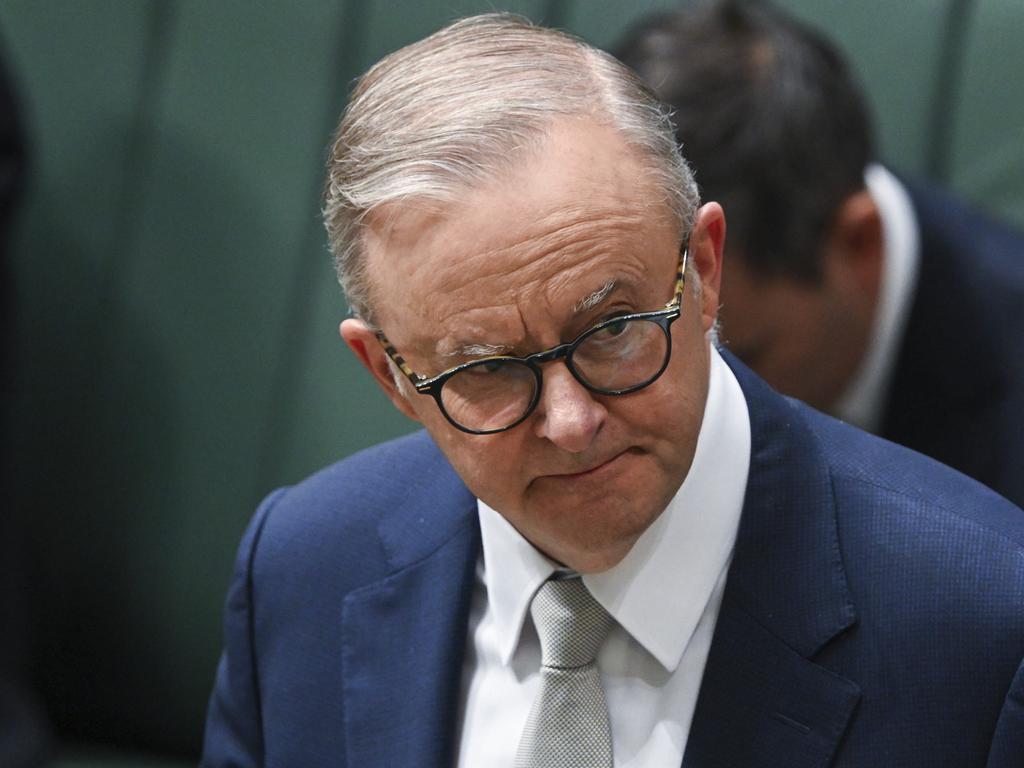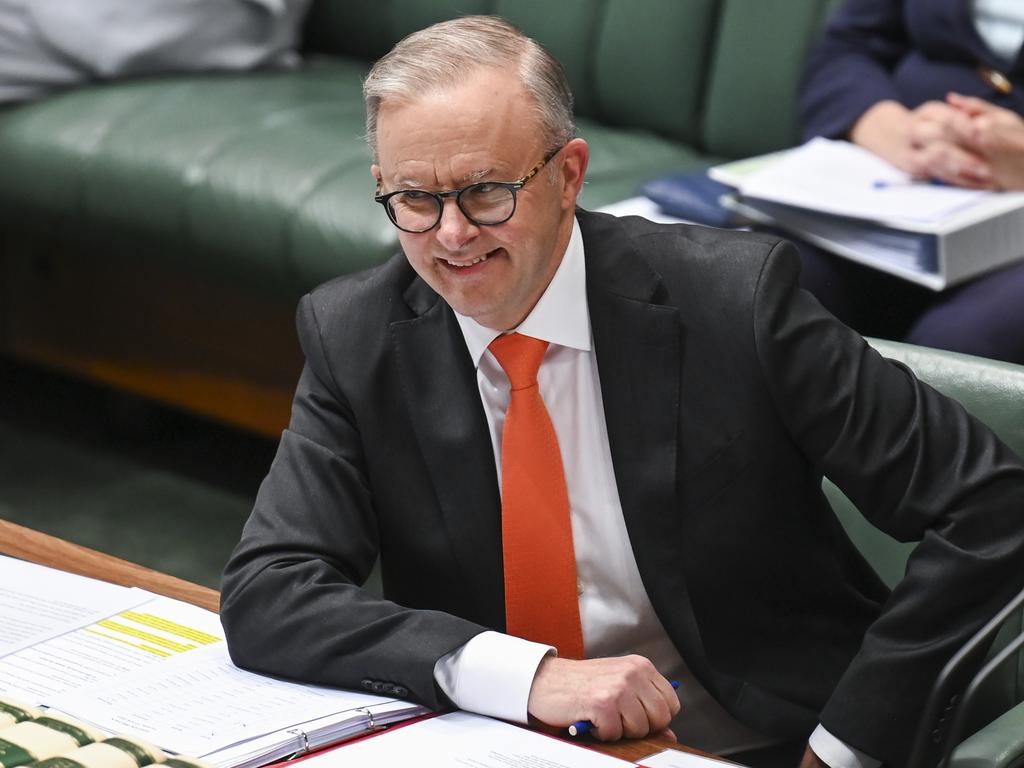Restraint needed as Indigenous voice to parliament divides Australia
This week highlighted Labor’s dilemma as the Coalition hardened its opposition to the referendum. Parliament was heavy with emotion and accusation, and speeches from female MPs confirm bipartisanship is a dead letter.

Nobody watching or reading the parliamentary exchanges in the Senate and the House of Representatives this week could doubt the historical stakes as parliament passed the referendum bill on Indigenous recognition or the scale of the political conflict now being unleashed.
Anthony Albanese hailed the bill’s passage, saying of the coming referendum: “Parliaments pass laws, but it is people that make history.” With the referendum question finalised, Indigenous Australians Minister Linda Burney struggled throughout the week when repeatedly asked questions about the scope of the voice in making representations.
Australia Day became the symbol of the dispute. On Tuesday Burney, reflecting the frustration of the government with such questions, said: “I can tell you what the voice will not be giving advice on. It won’t be giving advice on parking tickets. It won’t be giving advice on changing Australia Day.”
Yet the minister’s answer was misleading. The voice can make representations about Australia Day if it chooses.
That is because the constitutional amendment gives the voice a wide remit. The voice is also independent – no prime minister or minister can tell the voice what to do. Claims by Labor ministers about what the voice might or might not say – to reassure the public – are untenable. They don’t know; they can’t know.
The voice will decide its own priorities based on its Indigenous members. Closing the Gap will obviously be vital but the scope is virtually open-ended. As for Australia Day, the question is completely legitimate. Given that many Indigenous people brand it Invasion Day, a representation on this issue might eventuate.
This newspaper reported that Yes23 campaign director Dean Parkin told a forum the voice could be a mechanism to discuss January 26.
The government is under no obligation to accept any advice from the voice. But the entire purpose of the voice is to influence policy and pretending it would have no influence is absurd.
This week highlighted Labor’s dilemma – it is putting a referendum with a wide scope but wants to play down or deny the range of issues on which the voice can make representations. That Labor ends up in this position is a bizarre tactical failure given the repeated warnings it was given.
The Coalition has hardened its opposition to the voice. The week ended with Peter Dutton asking the Prime Minister to abandon the referendum because the public “is not ready to vote for the voice” – with the Opposition Leader saying the Coalition would support constitutional recognition and work with Labor to legislate a version of the voice.
That was never going to fly. Albanese denounced Dutton for misinformation, being “devoid of empathy” and talking “without a heart”. Accusing Dutton of a scare campaign, he said: “Indigenous people have an eight-year gap in life expectancy, a suicide rate twice as high and rates of disease and infant mortality and family violence so much worse than in the general community.”
The voice is turning into a political and personal conflict between Albanese and Dutton. The country faces a nasty few months. The strategy of the Yes campaign to focus on recognition, not the voice, is unlikely to work.
The government and opposition are talking past each other. Burney’s problem is that she has little option but to ignore or dodge Coalition questions about the near limitless scope of the voice.
This week offered a glimpse of the future campaign – while Burney was weak on the functioning of the voice, she spoke from the heart.
On Wednesday Burney told the parliament: “I have been to communities that are crying out for a different way of doing things. I have been to communities where babies are drinking sweet cordial instead of water because it’s cheaper.
“I have taken a friend who died at 43 of end-of-life renal failure to visit his son in jail. I have seen friends die in hospital when they were very young … So do not tell me what I do or do not know about Aboriginal Australia and do not tell me that the proposition that the Prime Minister has outlined is not needed in this country. I am not interested in culture wars; I am interested in closing the gap.”
It is a statement from the heart; this is the government case.
Two days before in the Senate, another Indigenous woman, Jacinta Nampijinpa Price, spearheading the No campaign, said: “I understand Australians want to do everything they can to help Aboriginal and Torres Strait Islander peoples in need. I have seen this empathy and goodwill time and time again.
“But I have also seen it exploited and I am seeing it exploited now … This is a dangerous and costly proposal. It is legally risky and full of unknowns. It is exploitative. It is emotionally manipulative. But, worst of all, from the day Mr Albanese put his wording to the Australian people, the process of division was begun.
“We are being divided. We will be further divided throughout this campaign. And, if the Yes vote is successful, we will be divided forever. I want to see Australia move forward as one, not two divided; that’s why I will be voting No.”
Price said people must examine the root of the voice proposal and ask themselves “if they truly believe that this is the answer”.
The opposite side of the No case had a sole voice, independent senator Lidia Thorpe, with a pitch to radical sovereignty: “Who’s going to listen to a token voice? Do you – just you – want the voice to tell you that you need to stop killing our people? … This is a colonial institution with colonial laws.
“I’m here – yes, I’m here – to infiltrate it, to rattle the cages and to destroy the white supremacy that is represented in this place … Why are we begging like paupers, again, to go into a white racist, colonial Constitution that was set up to deny everything that we are, to destroy our lands and our waters, to destroy everything, as quickly as they could, to extract as much resource as possible from stolen land, and to dispossess us and make a nice life for yourselves?”
Labor’s Assistant Minister for Indigenous Australians, Malarndirri McCarthy, appealed to the better angels of our nature: “I ask all Australians to ensure that we have our discussions and debates, our considerations as we walk this journey, this very sacred journey, of our country, with the utmost respect for one another – and that means all sides. All of us on the Yes side, I urge you to be mindful of the commentary and the conversations that we have with the broader Australian public. All those on the No side, I ask you to do the same. It is only then that we can find the better part of ourselves as a country, the better part of ourselves as Australians – as all Australians.”

It is a salutary comment. Repair and reconciliation will be needed regardless of whether Yes or No prevails. Speaking for the Greens, senator Dorinda Cox foresaw a decade of far-reaching change: “This change to the Constitution will not impact on our sovereignty, my sovereignty, and I would not be standing up here in support of this bill if I had any doubt in my mind … The Australian Greens remain committed to the full implementation of the Uluru Statement from the Heart, and truth, treaty and voice.
“The referendum is the first important step. I continue to push the government for the establishment of the Makarrata Commission to oversee that truth-telling and treaty-making. My message to all Australians is that, on referendum day, I will in fact be voting Yes to unite Australia, bringing us together for what I see is to be a decade of change.”
Speaking for the Liberal Party, opposition legal affairs spokeswoman Michaelia Cash told the Senate: “The Coalition does not believe that this is what the Australian people want. Once the voice is in the Constitution, it won’t be undone. Once a High Court makes an interpretation, parliament can’t overrule it. We’ll be stuck with the negative consequences and bad outcomes.
“And what we saw in the committee stage of the bill on Friday night and into Saturday morning is that the government either will not tell or, even worse, is unable to tell Australians the most basic details. The government did not have the answers.
“The big message out of all of this is that the voice is four things: it’s risky, it’s unknown, it’s divisive and it’s permanent. If you don’t know how the voice is going to work, my humble opinion is to vote No.”

During the committee stage Cash asked the minister with carriage of the bill, senator Murray Watt: “Will the voice have the freedom to determine the issues on which it makes representations?” Watt said “yes” and affirmed that the voice could “decide for itself” what it offered advice about.
This is consistent with the constitutional amendment. Yet the government spent the rest of the week trying to backtrack.
Albanese and Burney fell back on the second reading speech where Attorney-General Mark Dreyfus said the voice could advise on issues “specific” to Indigenous people and on general issues that affected Indigenous people “differently” from the rest of the community. The word “differently” is not in the constitutional amendment – and that’s what counts.
Moreover, it wouldn’t be hard anyway for the voice to demonstrate public policies were affecting Indigenous people in different ways.
What’s happening is that Labor feels the need to use the second reading speech to try to re-interpret and limit the meaning of the constitutional change to wind back the scope of the voice. It wants to make the referendum more palatable. But that won’t work. Neither the parliament nor the second reading speech can overrule the words of the constitutional amendment.
As constitutional lawyers have explained, the parliament can make laws about how the voice does its job but parliament can’t pass laws saying what the voice can and cannot make representations about.
Labor’s problem for the next three months will be trying to persuade the public what the voice will focus on when it has created a constitutional change where that discretion resides with the voice and the voice is able to make representations on matters that affect the general community. This is why Dutton calls the referendum “the most significant proposal to amend the Constitution since 1901”, a claim reinforced by the proposed creation of a new chapter in the Constitution.
The voice is intended to become a fundamental arm of our governance. Indigenous leaders, unsurprisingly and to their credit, have no interest in creating an institution that makes no difference or that exerts no influence or authority.
In his parliamentary reply to Dutton, Albanese pointed out the voice had no veto power. It was strictly advisory. He highlighted the false scare campaign Dutton had deployed 15 years ago against the apology made by prime minister Kevin Rudd, when Dutton claimed the apology was exposing the government to serious damage claims.
Referring to Dutton, Albanese said: “He actually stood up and walked out. That’s the Peter Dutton I know. That’s the Peter Dutton that Australians know. And we’re seeing it played out again.”
Albanese senses the voice is in trouble. That he feels the need to launch a character assault on Dutton testifies to the potential damage of the Coalition’s campaign. The contradiction is embarrassing. On the one hand Albanese claims the voice is a “unifying” moment for the country and on the other hand he needs to personalise an assault on Dutton as a leader “without a heart”.
The Prime Minister was replying to Dutton’s claim that the government refuses to level with the public about the voice, that Albanese treats the public with “contempt” and that Burney acts as though people “aren’t smart enough to understand the proposition being put to them”. Both Albanese and Dutton blame each other for the absence of any meaningful bipartisanship on the referendum. Albanese-Dutton rancour won’t help the referendum or the country. It confirms, however, that bipartisanship is a dead letter.
This is verified not just by the leaders but by the tenor and content of the Senate speeches delivered by female MPs as quoted above. The country is divided. Parliament this week was heavy with emotion and accusation. Restraint is going to be needed as we navigate the next three months.






The parliamentary debate was a mix of everything. It was uplifting, bitter, emotional, legalistic and pungent – a nation struggling over its future, divided at the approaching crossroads, with Indigenous women in the forefront, agents both of compassion and aggression.